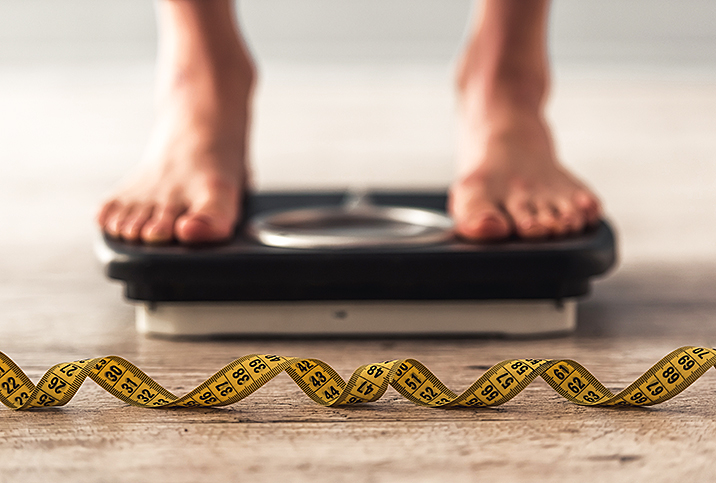Do Students Gain Weight During College?

Students heading off to college sometimes worry about the freshman 15, or the 15 pounds a first-year student is purported to gain. But college student weight gain may not be an issue after all. Is the freshman 15 real? Let's take a look.
The freshman 15 is scientifically unsubstantiated, according to James O. Hill, Ph.D., a nutritionist at the University of Alabama at Birmingham.
What is the freshman 15?
The freshman 15 is based on the idea that freshmen pack on the pounds as they transition to their new college lifestyle and navigate excesses such as all-you-can-eat dining halls and keggers—all while juggling stress and a lack of sleep.
The phrase originated in an unexpected place. The earliest known mention of the term "freshman 15" was found in a 1989 issue of Seventeen magazine.
The magazine's cover promised tips for preventing first-year college weight gain: "Fighting the Freshman 15."
The term "freshman 15" stuck. By the early 2000s, it appeared on the pages of newspapers and magazines such as Shape and Newsweek. The trend continues: A quick Google News search uncovered many 2023 articles suggesting students keep up the fight against the freshman 15.
The term may be uniquely American, but the idea isn't. Students in the United Kingdom are cautioned against gaining the Fresher Spread.
In New Zealand, freshmen are warned of the slightly more realistic Fresher Five.
But is there any truth to this idea? Is there a big difference between weight gain when a student leaves high school and heads off to begin their college freshman year?
Is the freshman 15 weight gain a myth?
In a word, yes. Students gain an average of three pounds over a period of six weeks to eight months during their first year of college, a 2015 study suggested.
What's more, this rate of weight gain is on par with adults of the same age who don't attend college, a 2013 study suggested.
Why do some college students gain weight?
Not all college freshmen gain weight. In fact, some lose weight, said Channing Brown, M.D., a professor and healthy eating expert at The University of Alabama at Birmingham. However, certain lifestyle changes that come with the transition may encourage weight gain.
Take a look at some of the most common reasons college students gain weight.
Stress
Many college weight changes can be attributed to the normal fluctuations in weight that occur during stressful periods of transition, said Tiffany Champagne-Langabeer, Ph.D., a nutritionist in Houston.
"College may also be a time of increased stress from the desire to succeed, earn good grades, fit in socially and compete with other students—not to mention the financial pressure of affording college," Champagne-Langabeer said.
College-level classes, homesickness and a lack of familial support may contribute to additional stress.
"Stress and other emotional challenges can result in mindless eating patterns and a resulting weight gain," Champagne-Langabeer said.
Notably, stress also can cause an increase in the hormone cortisol, which may lead to unwanted weight gain, she added. Often referred to as "the stress hormone," cortisol is released in times of increased stress to prepare your body for potential threats.
Access to unhealthy foods
One of the culprits behind freshman weight gain is unprecedented access to rich, greasy, sugary foods, according to Hill. Traditional college dining halls are usually packed with options such as hamburgers, grilled cheese sandwiches and french fries, along with free-flowing fountains of soda and juice.
"[Students] usually go from a more controlled and consistent home environment to a campus environment with easy access to food and snacks," Hill said. "Many likely consume more unhealthy foods."
The college meal plan makes it simple for students to access whatever they want. Their choices may not include healthy snacks or meals and instead lean toward high-calorie offerings.
Alcohol use
Many freshmen may be drinking alcohol for the first time on a regular basis.
"Alcohol use may increase in college and has been linked in studies to weight gain," Brown said.
Not only does alcohol contain calories, but drinking alcohol has been shown to influence blood glucose levels, stimulating cravings for fast foods and salty snacks.
Insufficient sleep
College students, known for all-night study sessions, late-night parties and prescription stimulant use according to a 2018 study, are notoriously sleep deprived.
A growing body of research has suggested that sleep deprivation can promote weight gain, Hill said. For example, adults who sleep less eat more calories and crave higher-calorie foods compared to those who get sufficient sleep, a 2022 study indicated.
There is a 41 percent increase in obesity risk among adults who sleep less than seven hours per night, according to a 2020 study.
How can you avoid the freshman 15 or unintentional weight gain during college?
Brown suggests students shouldn't become overly focused on weight changes.
"Our bodies are meant to fluctuate in weight and generally will remain around the same 10- to 15-pound range in the absence of illness or significant efforts to intentionally gain or lose weight," Brown said.
Instead of focusing on the scale and trying to avoid gaining weight, Brown recommends taking a holistic approach to your physical and mental health during the transition to college. How can you maintain a healthy lifestyle in college? Try the practices that follow.
Incorporate movement
Regularly incorporate some form of movement into your week—about 150 minutes weekly or 30 minutes for five days a week, according to numerous organizations.
Exercise doesn't have to be grueling or unpleasant, Brown said.
"I encourage individuals to find something that brings them joy and helps them relax and unwind," she said. "Walking to class, biking, dancing, playing a sport, yoga—anything that gets your body moving."
Many colleges offer free or low-cost classes, such as weight training and spin.
"These classes are a great way for new students to meet friends, stay in shape and decrease stress," Champagne-Langabeer said.
In addition to helping you maintain healthy body weight, physical activity comes with a host of other benefits.
"Exercise builds confidence, creates feel-good hormones, and sharpens focus for creativity and brain development," she added.
If your exercise habits need improvement, studies show regular exercise helps improve your mood and your overall well-being.
Get enough sleep
Another way to support your mental and physical health is to get enough sleep, Brown said. She cited the American Academy of Sleep Medicine, which recommends that adults older than 18 are recommended to get over seven hours of sleep per night.
A simple bedtime routine can help you unwind and maintain quality sleep. Brown recommended the following habits:
- Maybe take a shower.
- Turn off screens 30 minutes before bed.
- Read.
- Write in a journal.
- Listen to music at about the same time each night.
Try the MyPlate method
Brown is a fan of the MyPlate method, which helps you make healthy food choices without focusing on calories. The MyPlate plan divides your plate into fruits, vegetables, grains and proteins.
"In general, the idea [behind MyPlate] is that half of your plate would include fruits or vegetables and the other half would be divided between proteins and carbohydrates like grains and starchy vegetables," Brown said.
It's easy to change the way you eat without worrying about numbers.
Add healthy fat to one of these groups. Healthy fat comes from foods such as cheese, nut butter, oil or dressing, or avocado, Brown said.
"Avocados provide a healthy source of fat, vitamins and fiber, which sustain energy until the next meal," Champagne-Langabeer said.
Drink plenty of water
Hydrate with water and unsweetened beverages while avoiding sodas, juice and energy drinks.
"While I would never say to avoid [sodas, juice and energy drinks] 100 percent of the time, these beverages have more impact on blood sugar and overall health than most other foods," Brown said. "Focusing on drinking more water and unsweetened beverages can help with keeping you hydrated and helping you pay attention to what foods your body is craving."
Keep alcohol consumption to a minimum to avoid unnecessary calories and prevent craving for salty and greasy foods, she added.
Practice mindful eating
Eating mindfully and listening to your body's cues, rather than following a specific diet, is important, according to Brown. Her general guidance to all patients is to reflect before meals to figure out what sounds good and try to honor that. To help regulate your hunger, eat consistently throughout the day.
"Typically, three meals and two to three snacks daily can help with regulating your hunger and blood sugar and allow your body to get the nutrition it needs," Brown said.
Try to skip eating alone in your room. As part of a mindful eating practice, look for ways to enjoy meals more, such as eating with your friends.
How do you keep from becoming hyper-focused on the numbers on your scale?
One of the biggest problems with the "freshman 15" myth is that it can cause irrational fear of weight gain. Eating disorders and disordered eating run rampant in college, Champagne-Langabeer said.
About 10 percent to 20 percent of females and 4 percent to 10 percent of males in college develop an eating disorder, according to the National Eating Disorders Association (NEDA). Rates are rising.
To avoid triggering disordered eating, don't weigh yourself on a regular basis or track calories or food intake unless directed to do so for a specific condition by a medical professional, Brown said.
Champagne-Langabeer emphasized the importance of focusing on the way your body moves rather than the numbers on a scale.
"When you look at yourself in the mirror, appreciate your strong body for helping you walk to class or work out at that new spin class," Champagne-Langabeer said. "Starting the day on a positive note increases self-efficacy and self-compassion, and in the end will decrease stress and reduce chances for negative health behaviors."
The bottom line
Anyone concerned about weight gain or their relationship to food should consult with a professional.
"If you have specific health concerns, working with a registered dietitian to address them with a non-dieting approach may be helpful in addition to these general guidelines," Brown said.
And if you are overly concerned about your body image, relationship to food or college stress, check with your campus student health office to see what mental health resources they offer.
"Mood disorders are often present with weight changes," Brown said. "If you are feeling less interest in things you used to enjoy or feeling more down or anxious during this year of transition, it is a great time to reach out to a health professional—either a licensed mental health professional—like a counselor or psychologist—or a physician."




















